TODAY CQN brings you the twenty-first EXCLUSIVE extract from Alex Gordon’s book, ‘CELTIC: The Awakening’, which was published by Mainstream in 2013.
The book covers the most amazing decade in the club’s history, the Sixties, an extraordinary period when the team were transformed from east end misfits to European masters. This instalment takes you into the equally-thrilling seventies.
AS the likes of Tommy Callaghan and Harry Hood were brought in, Davie Hay was another who believed the Lions still had an important part to play. He said, ‘I think the young guys coming through would have actually benefited from a year or so mingling with and learning from those players in the first team. There was never any animosity between the experienced guys and the blokes like myself, Kenny Dalglish, Lou Macari or George Connelly coming through.
‘It was never a ‘them-against-us’ situation. Those guys were far too professional. So I don’t think it would have done us any harm at all to have had some of them around. We all knew Yogi didn’t want to go. People used to talk about his “horrendous” miss against Feyenoord and I hadn’t seen the entire film of the game until years afterwards. I don’t blame Yogi one bit. Yes, he might have scored, but give some credit to their keeper. He was pretty quick getting off his line to spread himself and block the shot. It’s ridiculous to blame Yogi for that defeat. With the exception of Evan Williams, we were all to blame.’
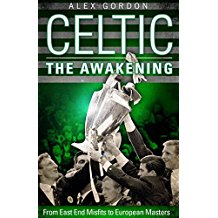
Tommy Gemmell was in no rush, either, to turn his back on Celtic. ‘Big Jock knew I didn’t want to leave even after I asked to go when I was dropped for the 1969 League Cup Final against St.Johnstone. He was well aware of my feelings for the club and my affection for the support. I was on the transfer list for two years!
‘On a weekly basis, I would ask Jock if there had been any enquiries. He would just wave his big left paw at me and say, “Naw, naw, I’ll let you know when there is.” Actually, I was well aware Barcelona wanted to sign me. They were managed by an Englishman called Vic Buckingham at the time and he definitely wanted me to go to Barca. I could never reveal this to Jock because that would have meant that I would have been tapped and, of course, that was illegal. So, I had to stay mum and just accept getting waved away every week, “Naw, naw, I’ll keep you informed.” Then, when Jock thought the time was right, I was out the door.
‘My argument was never about money, but Nottingham Forest had a £40,000 bid accepted and I was told to talk to them. After only a couple of minutes, they had made me an offer that trebled my basic wage of £65 and, on top of that, there was the bonus of £40-per-point, appearance money and extra cash for being an international. I still didn’t want to go!’
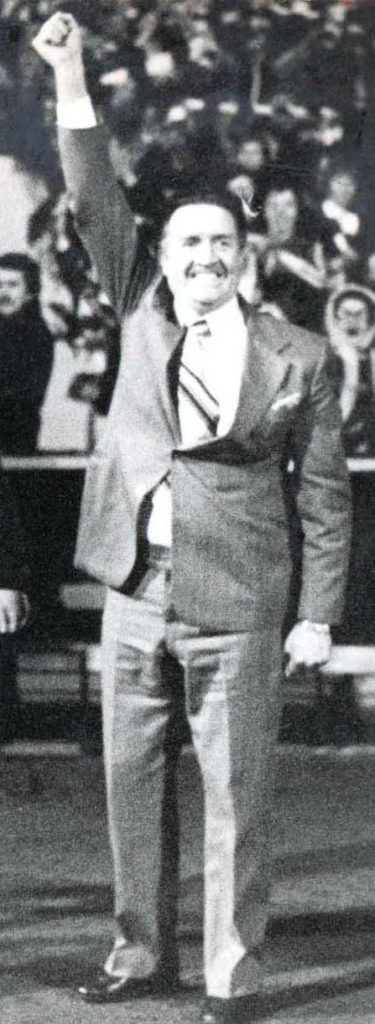
THE FIST OF IRON…Jock Stein adopted an uncompromising approach to managing Celtic.
Stein, without doubt, would have raged long and loud if he ever thought one of his players had been tapped, but the Celtic manager wasn’t beyond such skulduggery himself. Tommy Callaghan recalled, ‘I was in the Dunfermline reserves at the time a local reporter got in touch. He told me Jock Stein wanted to sign me for Celtic. I couldn’t believe it. Big Jock, of course, had been my manager at East End Park, so he had a fair idea what I could do. Excited? You bet! I may have been born in Fife, but I was a massive Celtic fan. A guy called Owen Moran used to be in charge of the Cowdenbeath Celtic Supporters’ Club and, if I wasn’t playing football the same day, he would make sure I would get a place on the bus travelling through to Glasgow.
‘So, it was brilliant to believe Celtic were interested in actually signing me. The pressman asked me to come to his house late on a Friday night as he was expecting a phone call. It was all cloak-and-dagger stuff because, essentially, I was talking to one club while I was still under contract with another. That could have led to all sorts of ramifications. George Farm was our manager at the time and he and I rarely saw eye to eye. He was a real gruff character and I could imagine his reaction if he thought Celtic were making direct contact with one of his players. Sure enough, on the night, a call came through from Jock Stein.
‘He told me, “I want you for Celtic. I’ve made a £30,000 bid, but Dunfermline are asking for £5,000 more. We’ll need to wait and see.” Now I realise in this day and age that £5,000 is mere pocket money for some players, but, back in 1968, it was a lot of money. In fact, £35,000 would have made me Jock Stein’s record signing for Celtic at the time. Jock told me to check with George Farm to see if there was anyone interested in me.
‘So, every morning, without fail, I would knock on the manager’s door, wait to be told to enter and ask if there were any bids for me. I was out of the first team at the time, so obviously I was expendable, but I also knew our boss could be awkward. “No, nothing doing,” I would be told. This went on for a few days until Farm blew up. “I’ve had enough of this,” he said. “We’ll sort this out.” Shortly afterwards, I was on my way to Celtic and, yes, Dunfermline got their extra £5,000, so everyone was happy.’
Eventually, Callaghan would head for the exit. Despite the infamous run-in with Stein before the Leeds game, he said, ‘It was absolutely wonderful playing for the club. I scored on my debut, a 4-0 win over Partick Thistle, and I picked up so many honours, including six league championship medals. I shared a dressing room at Dunfermline for a few years with some excellent players and they never got anywhere near a league badge.
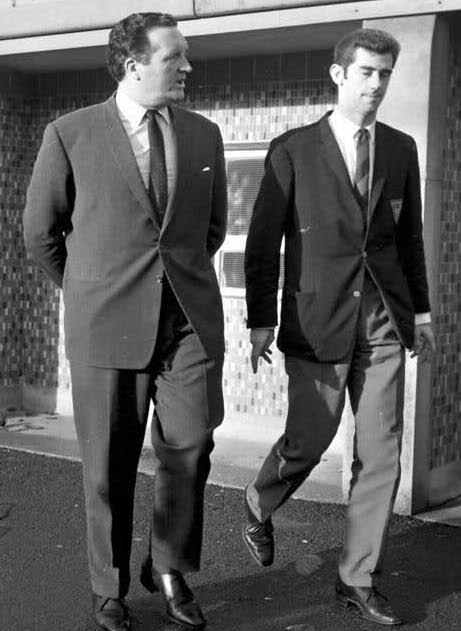
NEW BHOY…Tommy Callaghan with Jock Stein after signing from Dunfermline.
‘Of course, I was sad to go. Jock, though, pulled me aside one day and told me I should talk to Clydebank. I had to be philosophical. When your time’s up, that’s it. Your tea’s oot, as they say. I got in my car and headed for the Bankies’ ground at Kilbowie. It was only when I reached Clydebank that I realised I hadn’t a clue where Kilbowie was. I had never been there. I had to stop and ask a taxi driver for directions. When I got there, I thought, “What am I doing here?” It would be a bit of an understatement to say it was a culture shock.’
John Fallon, after fourteen years at the club, was another player who had no desire to leave Celtic. However, he was on his way when Jock decided he had served his purpose back in February 1972. Bertie Auld said, ‘The story I heard was that John was actually given the news by a team-mate after training. “I hear you’re going to Motherwell,” said the player. Fallon replied, “No, I’m not.” After a meeting with Jock, the goalkeeper signed for the Fir Park side two days later.
‘If Jock was ever hurt by having to release a player, then he hid it well. Maybe he did these things in private, but there was never a public show of emotion. Once a player was no longer considered good enough for Celtic, it was time to move on.
‘Jock was never slow to inform you there were other players out there who could come in and do your job. Jock always insisted, “A manager is only as happy as his unhappiest player.” So, The Boss simply eliminated his unhappiest player.’

Kenny Dalglish took centre stage at the start of the 1971/72 campaign and played against Rangers three times in the opening weeks; Ibrox hosting the trio of confrontations with Celtic Park still being rebuilt. He may have been a bit of a Rangers fan as a kid, but that didn’t prevent a ruthless Dalglish putting his former favourites to the sword. He scored in each match. There were two League Cup triumphs – 2-0 and 3-0 – and a 3-2 victory in the league. Tommy Gemmell has an interesting revelation about the new Bhoy Wonder.
He recalled, ‘I had heard Kenny was about to get a free transfer in the summer. Back then, he wasn’t anything like the player he would become, that’s for sure. However, at the end of that season, Celtic were invited to play a Testimonial Match for a Kilmarnock player, Frank Beattie, at Rugby Park. Kenny had alternated between midfield and up front without, to be honest, being any great shakes. Jock played him as a striker against Killie and I think he scored five goals as we won 6-2. Jock saw him in a different light that night. Who knows what might have happened if Kenny hadn’t performed so well at Rugby Park?’
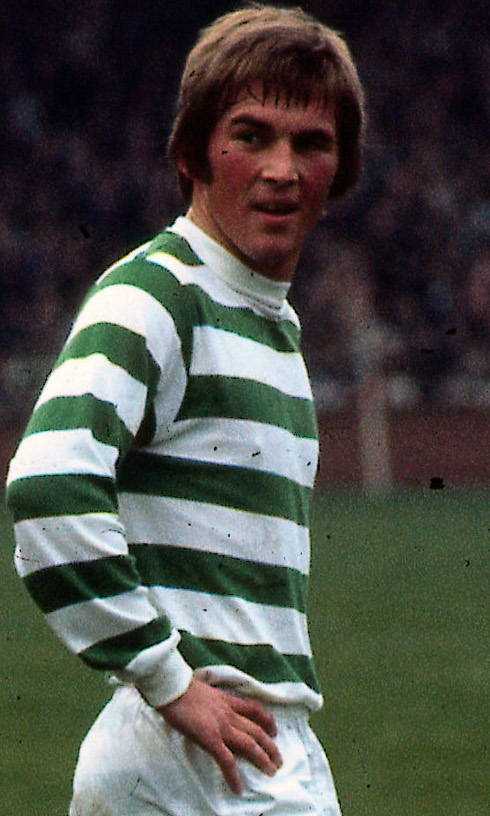
BHOY WONDER…Kenny Dalglish gatecrashed the Lisbon Lions line-up.
Dalglish was also on the scoresheet in the final of the League Cup on 23 October, but was as bewildered as the rest of his team-mates to be on the receiving end of a shocker of seismic proportions against newly-promoted Partick Thistle. It was one of the craziest outcomes of a game in Celtic’s history; a 4-1 defeat with 62,740 fans witnessing an impossibility transcend to reality.
Harry Hood still groans at the memory. ‘We were 4-0 down at half-time and we just could not quite take in what was happening all around us. By the time we reached the dressing room at the interval it would be accurate to say we were stunned. As the scoreline dawned on us, though, I can tell you this – we still believed we could beat them. Sounds daft now, I suppose, but that was the genuine belief. I remember Jock Stein being quite calm. “If they can score four against us in forty-five minutes, we can score five against them in forty-five minutes,” he reasoned. By the time we went out for the second-half he had convinced us we would win. “Score a goal in the next five minutes and you’ll be on your way,” we were reassured by our manager.’
The first period is better forgotten. Celtic were already without the injured Billy McNeill with George Connelly taking over at centre-half, the main defensive position in which he was never completely comfortable. Jimmy Johnstone took a sore one from Ronnie Glavin, a future team-mate, early on and had to go off with Jim Craig, the only allowed substitute, coming on in his place. It was an auspicious early period. Remarkably, Thistle mustered four shots at Evan Williams during that period – and all four eluded the green-jerseyed keeper. Alex Rae beat him with an effort from the edge of the box that flew high into the net.

No-one seemed unduly worried because Celtic, as they had done so many times over the years, were quite generous in gifting opponents a goal of a start. Bobby Lawrie cut inside from the left to belt a screamer low past Williams for the second. Still, there was no anxiety on the terracings or, apparently, on the pitch. Dennis McQuade smuggled in No.3 from almost under the crossbar with the Celtic defence doing a fair impression of anything on display at Madame Tussauds.
Frowns all round, except, of course, from the Firhill contingent whose wildest dreams were heading for orbit. With Celtic in total disarray, Williams and his colleagues froze when a right-wing corner-kick dropped into the penalty area and Jimmy Bone, who couldn’t have been afforded more space if he had been rattling a big bell and yelling, ‘Unclean…unclean’, just about walked the ball into the net.
Hood added, ‘A friend of mine told me later he couldn’t make it to the game and was tuning in to the BBC for an update. The half-time scores around the country were coming up on the old teleprinter and Frank Bough spluttered when the news came through from Hampden. My pal swears he said: “Celtic 0 Partick Thistle 4. No, that’s an obvious mistake. We’ll get the correct scoreline for you in a moment.” Minutes later, Bough added, “That is the right half-time score in the Scottish League Cup Final. I’ll give it to you again – Celtic 0 Partick Thistle 4. That’s incredible.” If he didn’t believe what was going on, I can assure everyone the players in the Celtic dressing room didn’t have much of a clue, either.’
Williams recalled, ‘I got the bulk of the blame for that defeat and I would be the first to hold up my hands if I thought it was solely down to me. I’ve watched film of that game and I don’t accept it was all my fault. Certainly, it was a dreadful forty-five minutes for everyone. We just could not get going and I don’t mean to take anything away from our opponents by saying that. As Harry points out, every last Celtic player left the dressing room at half-time utterly convinced we could turn things around.
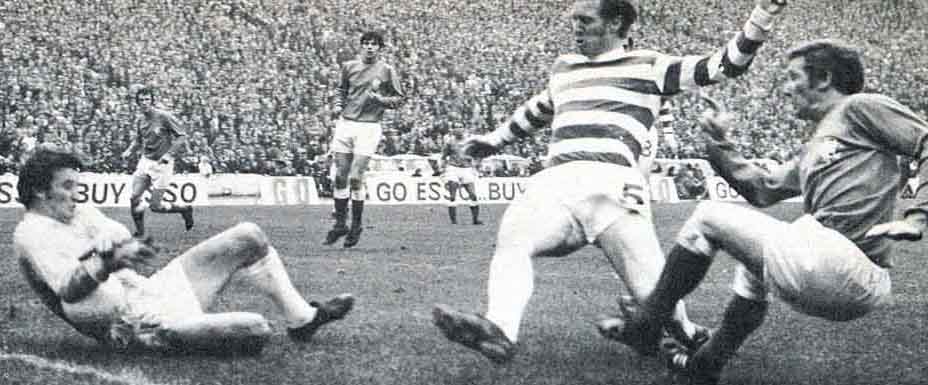
GETTING DOWN TO BUSINESS…Evan Williams thwarts Rangers’ Alex MacDonald as Billy McNeill challenges.
‘We had to accept we had been involved in a freakish performance in that opening forty-five minutes and we would play like the real Celtic in the second period. As I recall, we peppered their goal right from the off and there was a typical Bobby Murdoch drive that looked like heading for the top corner. It just kept rising, though, and missed the target by inches. If that had gone in, who knows? Kenny Dalglish eventually scored when Alan Rough pushed out a Lou Macari shot, but we had left ourselves with too much to do. It was Thistle’s day.’
Gemmell echoed, ‘I wouldn’t want to take any credit away from Thistle, but we were an absolute shambles that day. Someone told me not that long ago that he had watched the entire ninety minutes again, which must have been painful because he was a big Celtic fan. He assured me our opponents had five shots on target that afternoon and we had over twenty. They only count, though, if they hit the net. Jock immediately went out and bought a new goalkeeper, Denis Connaghan from St.Mirren. Dixie Deans, an out-and-out striker, was also brought in from Motherwell. We played Thistle a month later in a league game at their place and gubbed them 5-1 just to let them know what it felt like!’
Stein set in motion the move for Connaghan only hours after the Thistle debacle. The keeper recalled. ‘I had been linked with Celtic a couple of times and I was told that Saturday night that Jock wanted to sign me. I thought, “I’ve heard it all before.” Sure enough, though, on Monday morning he telephoned me, we met at Love Street and the deal was struck.
‘Of course, I was delighted at the time, but it was just a pity that my signing for the club arose from a Cup Final defeat. It was well-known that Jock hated goalkeepers. He used to say to me, “When I die, Denis, I want to come back as a Celtic goalkeeper. It’s the easiest job on earth.” I suppose it was true. Celtic attacked in every game, but in that sort of situation your concentration had to be that bit sharper.’

The Scottish Cup Final against Hibs in May, at the scene of the earlier crime, was a lot more pleasurable; a magnificent 6-1 triumph over an excellent Easter Road side that paraded six internationals in Jim Herriot, John Brownlie, Erich Schaedler, John Blackley, Arthur Duncan and skipper Pat Stanton, who would later join Celtic, but whose influence, sadly, would be cut short through injury. Without being cruel, Partick Thistle may have been perceived as mongrels in the earlier Cup Final, but Hibs had earned the right to be termed pedigrees.
Williams, after the October disaster, had won his way back into Stein’s favour and into goal. The goalkeeper recalled, ‘We had to banish the memory of that Thistle defeat and a game against Hibs was the ideal platform. Big Billy McNeill sidefooted the opening goal past Jim Herriot after connecting with a long diagonal left-wing free-kick.’ Ironically, it was the same keeper against whom McNeill had sent a pulverising header beyond to kick off the Celtic cavalcade seven years earlier. Alan Gordon knocked in a scrappy equaliser, but the day belonged to Celtic and Deans claimed a memorable hat-trick with Macari adding two.
It had been an interesting seventeen days in Deans’ career. His new club had reached the European Cup semi-final to face old rivals Inter Milan. Following a goalless draw in the first leg at the San Siro, Celtic were favourites to complete the job in Glasgow and reach a third final in five years in football’s most prestigious tournament. The second tussle ended goalless, too, after extra-time and the tie would be decided on penalty-kicks. Deans, who had replaced Dalglish during the game, elected to take the first. Unfortunately, he sent his shot flying over the bar and the Italians fired all five of their efforts beyond Williams to advance 5-4 where they lost 2-0 to Ajax in the final.
However, there were celebrations for the seventh successive season in the league championship when Celtic took pole position with sixty points, ten clear of Aberdeen. Rangers were third, sixteen points adrift. The Ibrox men, after losing three times inside a month at the start of the campaign, succumbed again in the January fixture. The unlikely matchwinner for Celtic was left-back Jim Brogan who headed in the second goal in the last minute. Johnstone had claimed the opener.
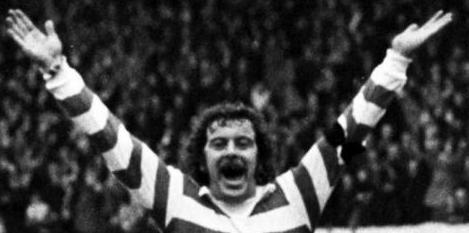
TITLE WINNER…happy days for master marksman Dixie Deans.
The 1972/73 pursuit of the flag went right to the last game. Celtic, with a vastly superior goal average over Rangers, visited Easter Road to take on a Hibs team that had beaten them 2-1 in the League Cup Final earlier in the season. On that occasion, Dalglish scored for Celtic, but Pat Stanton and Jimmy O’Rourke blasted two behind Williams. That game racked up an unwanted hat-trick, three straight defeats in three League Cup Finals. However, that loss would pale into insignificance if the title was claimed for the eighth consecutive year. Stein’s side were on fifty-five points and the Ibrox men on fifty-four, so a draw in the capital would have still seen Celtic take the championship irrespective of what their age-old foes achieved against East Fife in Glasgow.
Stein was at his bombastic best before the Edinburgh kick-off. ‘We’re not interested in playing for a point,’ he said. ‘That’s not our style. I have complete belief in these players and we are looking for a victory. I’m sure we’ll get it.’ His players didn’t let him down; Deans hitting two and Dalglish getting one in a 3-0 romp. Rangers beat East Fife 2-0 with goals from Cutty Young and Alfie Conn, who would later cause something of a stir by signing for Celtic. ‘Who could say no to Jock Stein?’ he queried reasonably at the time of his £65,000 transfer from Spurs in 1977.
Conn was on target for Rangers when they beat Celtic 3-2 in the 1973 Scottish Cup Final. Dalglish thumped Stein’s men ahead after a neat flick from Deans, but the Ibrox side were gifted a sloppy equaliser when Alex MacDonald was allowed too much time on the left wing before picking out Derek Parlane smack in front of goal. Even then, it looked as though Ally Hunter, yet another goalkeeper brought to the club by Stein, could have done better dealing with a powder-puff header, but it eluded him and it was 1-1. Conn then showed a flash of individual brilliance in the second-half when he carried the ball about thirty yards before flicking it past the outrushing Hunter.

Connelly netted with a penalty-kick after John Greig had punched a Deans shot off the line. In those days it wasn’t an automatic red card for the offence, so the Ibrox contingent’s complement remained at eleven. With the clock ticking down, Rangers got a massive break. Derek Johnstone headed a Tommy McLean free-kick low past Hunter, again looking slow to react to the danger. The ball thudded against the inside of the right-hand post, ran along the line and eluded everyone until it found the unmarked Tom Forsyth at the back post.
Not a known goalscorer, the defender looked alarmed when he was presented with the opportunity. He stabbed at the ball, seemed to put his boot over it before having another go and this time he made contact and the ball trickled over the line. Not a memorable finish, then, but one sufficient enough to take the silverware to Ibrox.
‘That was another of those games where you feel like asking, “Wait, can we start all over again, please?” said Davie Hay. “We won’t make the same mistakes.” Unfortunately, football doesn’t work like that. If you make an error you are normally punished and there are no second chances. I thought we were better than Rangers that day, but you can’t argue with the facts. They scored three, we scored two and they won the trophy.’
The European adventure had hardly gained momentum when Celtic were knocked out by the Hungarians of Ujpest Dosza in the second round, 4-2 on aggregate after being thrashed 3-0 in the second leg at their place.
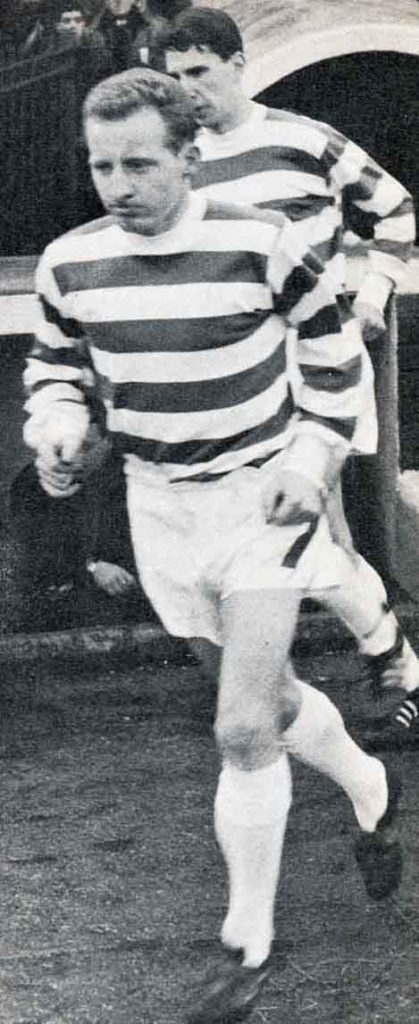
GOALTAKER AND GOALMAKER…the remarkable Jimmy Johnstone.
Jimmy Johnstone scored the only goal as Celtic claimed the first Old Firm scalp of the 1973/74 campaign and Bobby Lennox staged an action replay when Rangers came to Parkhead for the January fixture. The Ibrox side and Hibs were always there or thereabouts as Celtic targeted a world record of nine league titles on the trot. Jock Stein had freshened up the side, but it also saw the sad exit of the truly wonderful Bobby Murdoch, given a free transfer at the end of an awesome fourteen years at the club that saw him win eight league championships, four Scottish Cups, five League Cups and, of course, a European Cup medal.
He made his debut against Hearts and scored in a 3-1 win six days before his eighteenth birthday. He played 484 games for the club he adored all the way through childhood and into adulthood. Murdoch also racked up 105 goals, most of them unforgettable. It’s difficult to recall him ever netting a tap-in. He joined Middlesbrough exactly a month after his twenty-ninth birthday on a free transfer. Murdoch was the eighth Lisbon Lion to move from the club, leaving Billy McNeill, Jimmy Johnstone and Bobby Lennox to carry on the good work.
Bertie Auld said, ‘Bobby Murdoch was such a lovely guy. Speaking personally, he just left me with so many happy and treasured memories. He was an exceptional talent and everyone recognised that apart from one man – himself. He was just so down to earth. Do you know he had the nickname ‘Chopper’ and Big Jock hated it? He earned that moniker during the Battle of the River Plate, our third game against Racing Club in Uruguay.

‘Bobby had had enough of being spat on and kicked and he just lost it with about twenty minutes or so to go. He had seen his wee pal Jinky sent off and he had had enough of injustice. Bobby could look after himself and any Argentine who was daft enough to go near him late in the game was decked. The name ‘Chopper’ was born in that Montevideo madhouse. When we talked about ‘Chopper’ in the dressing room, Big Jock would shout, “Don’t call him that!” So, naturally, the nickname stuck.’
Stevie Murray, bought for £50,000 from Aberdeen, was in the position normally occupied by Murdoch when the league season kicked off with a 3-2 win over Dunfermline at East End Park. Whereas Murdoch made the ball do all the work, the latest acquisition was a runner, who liked to come forward with the ball at his feet. It was an identical situation with Tommy Callaghan, who would be the first to admit he was never in Auld’s class as a passer of the ball, but had an engine that could see him run from one penalty box to another all day without apparently stopping for a breather.
Billy McNeill observed, ‘I believe Jock thought a lot of teams had worked out how we played and he wanted to change things. He was eager to give them something else to think about. That’s why the likes of Tommy Callaghan and Stevie Murray came into his thought process. This was a different Celtic team to the one the supporters were used to.’
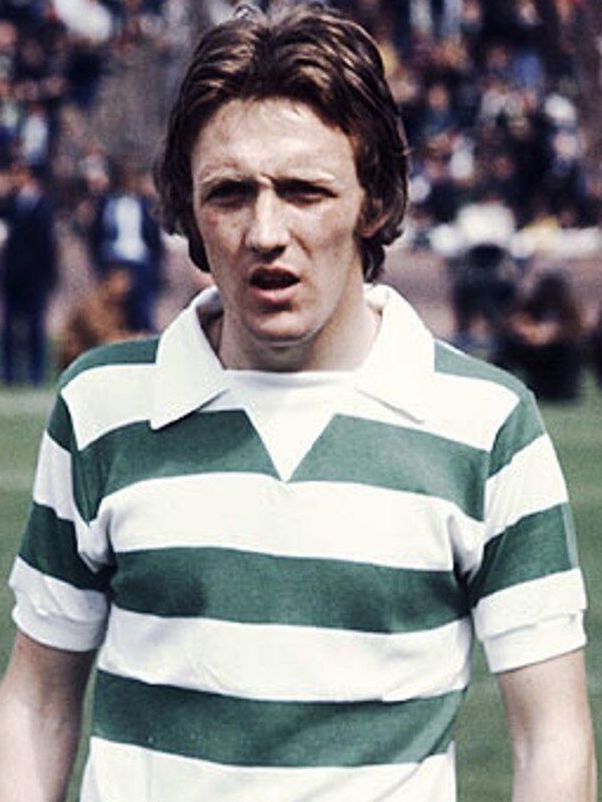
BRIAN McLAUGHLIN…an exciting prospect before tragedy struck.
The manager also introduced a teenager named Brian McLaughlin, a smooth running and passing midfielder, a startling combination of elegance and awareness in one so young. He played in the opening five League Cup-ties of the 1973/74 campaign. He was paraded in the opening league day success at Dunfermline before tragedy struck only a month into the season.
McLaughlin was left horribly damaged after a coarse and brutal challenge by Clyde defender Willie McVie. Apart from one brief substitute’s appearance in the second last league game, with the title already won, that was the end of the youngster’s season. By and large, it was also the destruction of what should have been one of the brightest of careers at Celtic.
McLaughlin never recovered properly from his cruciate ligament injury. Hay recalled, ‘Jock was distraught. He believed that Brian could have been the pick of all his young players. One look at Brian and you immediately understood why the manager had such high hopes. I had him at Motherwell for a spell when I was manager. After Celtic, he had gone to Sligo Rovers as part of his rehabilitation. But it was all over for him at Celtic; he wouldn’t be able to perform at that level again. He went to Ayr United before coming to Motherwell. Sadly, he wasn’t the same player. If he was bitter at the way things turned out for him, I never detected it.’ Connelly added, ‘Jock told me Brian would have been better than any of us if it hadn’t been for that injury. I played that day against Clyde and once again it demonstrated just how fickle football can be. One bad tackle and that’s your career over. As I recall, we won 5-0 in a canter, so there was no need for wild tackles flying around.’
Gemmell thought so much of the player he tried to sign him from Celtic in 1977 during his managerial stint at Dundee. He recalled, ‘I was looking for a playmaker in the middle of the park and I thought Brian could still do a job for us. I was aware of his injury problems, but I was willing to take a chance. I put a call into Big Jock. He wasn’t available, but I got his assistant Davie McParland. I asked him, “Is there any chance of doing some business with Brian McLaughlin?”
‘Davie replied, “I’ll have a word with Jock. Can you phone back in the morning?” Now, you might have thought Jock would have done a former player, a Lisbon Lion, a wee favour. You would be wrong. I duly got back in touch early the next day. Imagine my surprise when I was informed McLaughlin had just signed for Ayr United!’

* TOMORROW: Don’t miss part three of ‘FAREWELL TO THE LIONS’, another dramatic instalment from Alex Gordon’s book, ‘CELTIC: The Awakening’ – only in your champion CQN.

